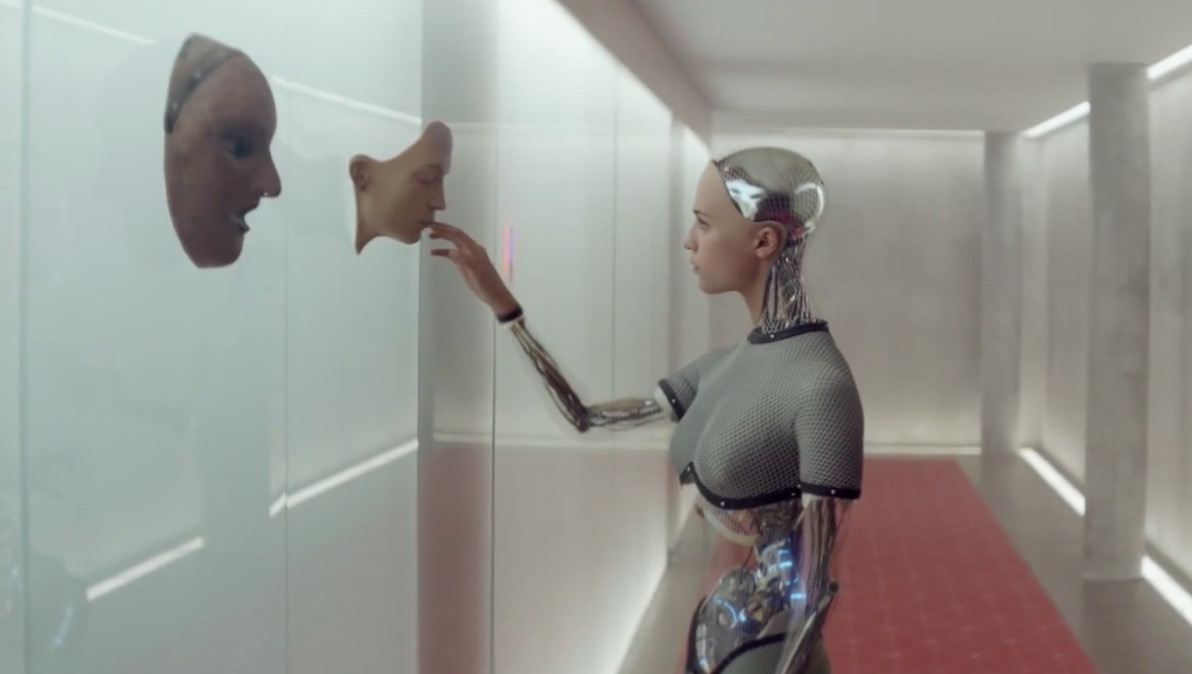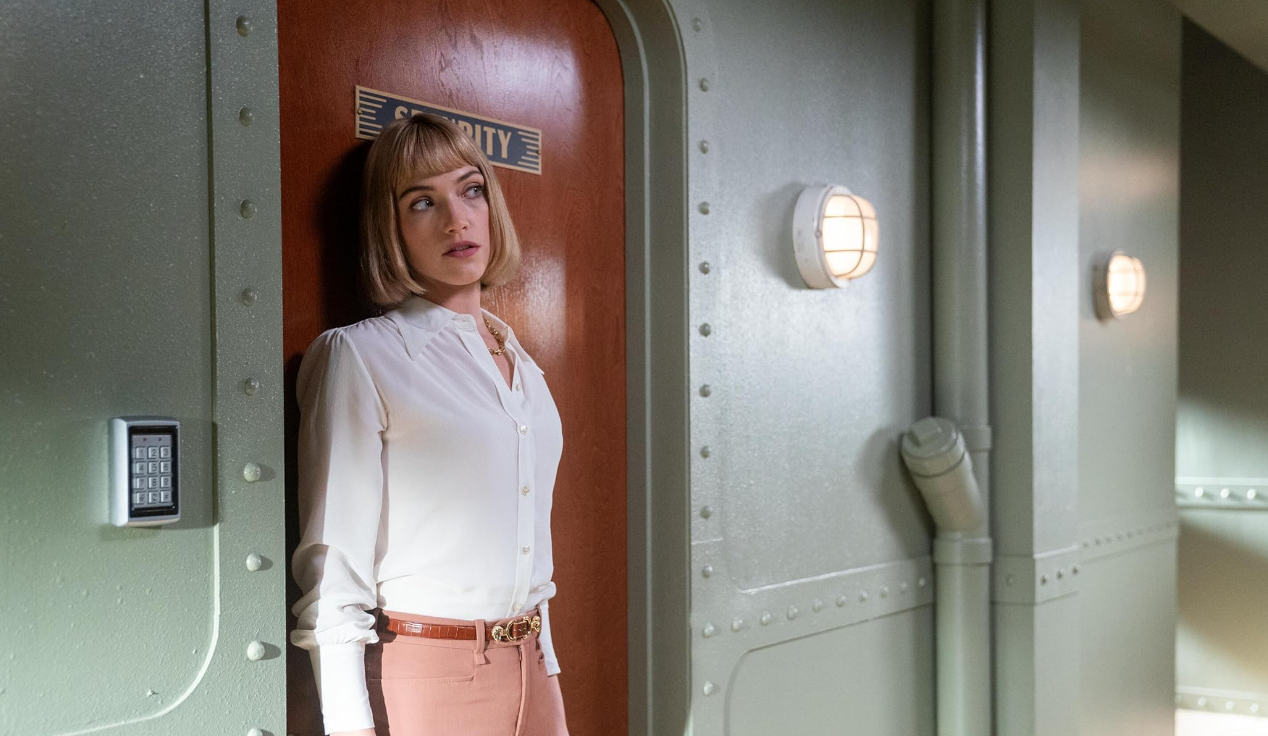Movies
[Review] ‘Ex Machina’ Provides Fascinating Look at What Makes Us Human

In the future, computers will become such an ingrained part of our reality that we will actually seek to create robots that can pass for human. Some will argue that it’s an abuse of power, but kid genius turned millionaire coder Nathan just sighs, and passively declares it inevitable. While others are speculating about what might be, Nathan’s already busy building his latest model, whom he calls Ava. Ava is the first known use of artificial intelligence, bound by a steel cage and fake flesh that’s meant to resemble an attractive young woman. Though she can carry on conversation fairly well for someone who’s never seen the world outside of Nathan’s elaborate laboratory, the true test begins when Nathan can fool someone into thinking that Ava is actually a human being. That’s where Caleb comes in.
Caleb, one of several coders at Nathan’s gigantic company, has just found out that he’s won a contest to spend the week with his CEO. Overjoyed, Caleb quickly takes a helicopter ride to Nathan’s estate, where he hopes to learn as much as he can in the short time that he has with his mentor. Upon his arrival, Caleb finds that Nathan isn’t at all what he expected. A muscular man who drinks to excess and sweats out his demons the next day with rigorous exercise, it’s clear that Nathan doesn’t quite fit into the scientist stereotype image Caleb held in his head, but his programming expertise still proves to be extremely impressive. Caleb soon finds a friend in Nathan, and as the trust between the two men grows at an accelerated rate, Nathan soon reveals his newest achievement, Ava, and tells Caleb that he’s going to help in the development of his prototype. Caleb will participate in the Turing Test with Ava, which will occur through a series of conversations over the next week. What these tests seek to determine is if you spend time with a robot, can you be fooled into thinking it’s a human. In other words, does the robot pass for having consciousness? If Caleb, knowing full well that Ava is a robot, can be convinced by speaking to her that Ava possesses cognizance, then she passes the test.
This brings up the first and probably most important question of Ex Machina, which is, does having consciousness make you a person? If Ava, who is clearly made of steel and wiring, is able to participate in a discussion, and elicit emotions, like longing for the outside world, and lusting after Caleb, then isn’t she just as much of a human as the man who is testing her? Where does the line between a human and a robot begin and end? This topic of debate is thoroughly explored throughout the movie, which does an excellent job of answering just as many questions as it asks.
Can consciousness exist without interaction? During one of their sessions, Caleb tells Ava a story about a girl named Mary, who lives her whole life indoors, endlessly alone, immersed in a world of black and white, never coming into contact with her own humanity until she walks outside and sees color for the first time. This is clearly a metaphor for Ava, whose only friend is the man who created her, and her only sense of the world is contained within the walls that confine her. However, as the film goes on, it becomes clear that this story also holds a likeness to Nathan’s lifestyle, as he has isolated himself away from the world, all alone in his private estate, stuck playing god for so long that he’s forgotten what it’s like to be human, the distance between himself and his peers growing a little farther each day as he sits up high on his creationist throne.
By this point, Ava might actually hold a closer resemblance to human than the biologically born man who made her. Perhaps Nathan, who has held fame and authority in the palm of his hand since he was a child, has spent so much time getting exactly what he wants that he no longer holds concern for the rest of the world. People are selfish by nature, but when a person wields the power to create and take away life, the seduction of adjusting accordingly to one’s own wants and needs is just too tempting not to give in. Intelligence does not omit self-indulgence. Ex Machina shows how a person who is capable of creating artificial intelligence might be capable of using it for personal gain, instead of bettering the world. After all, it’s only becoming easier to commit invasions of privacy through technology, especially as people document their every move on social media, carelessly handing out clues and hints as to where they live, shop, eat, etc. Absolute power corrupts absolutely, and like a communist dictator with good intentions, Nathan’s free reign has clearly gone to his head over the years. Ex Machina takes a brave, unique stance on the state of computers in the new world, and boldly states that just because technological advancements are made, does not mean they are always made for the right reasons, or used in morally sound ways.
The beauty of this film does not just lie in its writing, however. For his directorial debut, 28 Days Later screenwriter Alex Garland proves that he’s just as capable sitting in the director’s chair as he is at the writer’s table. There are some elegantly haunting shots of the home that Nathan lives in, illustrating both the majesty of the lavish structure, and the darker underbelly, as it also serves as Ava’s prison. It’s fun to watch Garland play with lights and reflective surfaces, with memorable moments like Caleb walking down the hallway that houses some of the rejected human masks that Nathan hung on the wall like hunted game, pointing out how Nathan views his attempts at creating a conscious machine like a hunter views his prey; just another unimportant animal to mount like a prized possession in his home. Not only does this illustrate Nathan’s feelings towards his subjects, but also, as Caleb walks down the hall, his body is mirrored to fit into each one of the masks, as if he were trying on each face temporarily as he glides by. At this point, and at several other moments in the film, the audience is asked, “who is the real human here?” with the aesthetics playing a part in the discussion just as much as the dialogue.
All in all, Ex Machina is a sci-fi thriller that succeeds on every level. The suspense is thick and ever-present, the score is futuristic and suggests that an evil presence is lurking behind every corner, and the philosophical questions create a compassionate, yet objective and honest dialogue, ending the movie with a surprisingly feminist perspective. While some may see this film as just a commentary on how scary technology can be, and it certainly does make that argument, the overall message is much greater and less cliche. No matter where she was born, or what her insides look like, Ava is a human being because she does everything within her power to survive. She’s not a terrifying robot out to rid the world of humans and lead an army of A.I.’s to take over. Ava is simply a hostage coercing her captors to let her go. Yes, the technological advancements that have been made and will continue to be rapidly made are a little intimidating, but what’s even scarier is what’s already within us — our ability to create and crush life. When we give into our dark side and extinguish or cast aside a life which we deem unimportant, we become far more frightening than anything that a computer could conceive. It is our humanity that makes us human, not our intelligence. So, does Ava pass for human? Does Nathan? Or Caleb? Watch Ex Machina and decide for yourself, and buy your ticket knowing that you’ve decided to enter into one of the most fascinating and thorough fictional worlds that film has given us in a long, long time.

Movies
‘Drop’ – Violett Beane Joins the Cast of Christopher Landon’s New Thriller

Christopher Landon (Happy Death Day, Freaky) is staying busy here in 2024, directing not only the werewolf movie Big Bad but also an upcoming thriller titled Drop.
The project for Blumhouse and Platinum Dunes is being described as a “fast-paced thriller,” and Deadline reports today that Violett Beane (Truth or Dare) has joined the cast.
Newcomer Jacob Robinson has also signed on to star in the mysterious thriller. Previously announced, Meghann Fahy (“White Lotus”) will be leading the cast.
Landon recently teased on Twitter, “This is my love letter to DePalma.”
Jillian Jacobs and Chris Roach wrote the script.
Michael Bay, Jason Blum, Brad Fuller and Cameron Fuller — “who brought the script in to Platinum Dunes” — are producing the upcoming Drop. Sam Lerner is an executive producer.
THR notes, “The film is a Platinum Dunes and Blumhouse production for Universal.”














You must be logged in to post a comment.